Fleurs du Mal Magazine


Or see the index
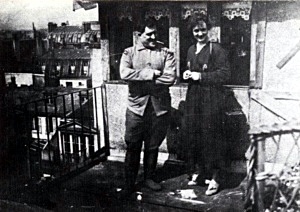
Guillaume Apollinaire
(1880 – 1918)
Mon Lou la nuit descend
Mon Lou la nuit descend tu es à moi je t’aime
Les cyprès ont noirci le ciel a fait de même
Les trompettes chantaient ta beauté mon bonheur
De t’aimer pour toujours ton cœur près de mon cœur
Je suis revenu doucement à la caserne
Les écuries sentaient bon la luzerne
Les croupes des chevaux évoquaient ta force et ta grâce
D’alezane dorée ô ma belle jument de race
La tour Magne tournait sur sa colline laurée
Et dansait lentement lentement s’obombrait
Tandis que des amants descendaient de la colline
La tour dansait lentement comme une sarrasine
Le vent souffle pourtant il ne fait pas du tout froid
Je te verrai dans deux jours et suis heureux comme un roi
Et j’aime de t’y aimer cette Nîmes la Romaine
Où les soldats français remplacent l’armée prétorienne
Beaucoup de vieux soldats qu’on n’a pu habiller
Ils vont comme des bœufs tanguent comme des mariniers
Je pense à tes cheveux qui sont mon or et ma gloire
Ils sont toute ma lumière dans la nuit noire
Et tes yeux sont les fenêtres d’où je veux regarder
La vie et ses bonheurs la mort qui vient aider
Les soldats las les femmes tristes et les enfants malades
Des soldats mangent près d’ici de l’ail dans la salade
L’un a une chemise quadrillée de bleu comme une carte
Je t’adore mon Lou et sans te voir je te regarde
Ça sent l’ail et le vin et aussi l’iodoforme
Je t’adore mon Lou embrasse-moi avant que je ne dorme
Le ciel est plein d’étoiles qui sont les soldats
Morts ils bivouaquent là-haut comme ils bivouaquaient là-bas
Et j’irai conducteur un jour lointain t’y conduire
Lou que de jours de bonheur avant que ce jour ne vienne luire
Aime-moi mon Lou je t’adore Bonsoir
Je t’adore je t’aime adieu mon Lou ma gloire
Guillaume Apollinaire Poèmes à Lou
fleursdumal.nl magazine
More in: #Archive Concrete & Visual Poetry, *War Poetry Archive, Apollinaire, Guillaume, Archive A-B
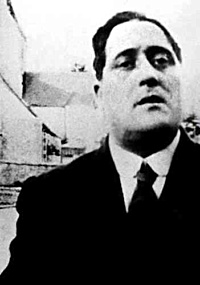
Guillaume Apollinaire
(1880 – 1918)
Il y a
Il y a un vaisseau qui a emporté ma bien-aimée
Il y a dans le ciel six saucisses et la nuit venant on dirait des asticots dont naîtraient les étoiles
Il y a un sous-marin ennemi qui en voulait à mon amour
Il y a mille petits sapins brisés par les éclats d’obus autour de moi
Il y a un fantassin qui passe aveuglé par les gaz asphyxiants
Il y a que nous avons tout haché dans les boyaux de Nietzsche de Goethe et de Cologne
Il y a que je languis après une lettre qui tarde
Il y a dans mon porte-cartes plusieurs photos de mon amour
Il y a les prisonniers qui passent la mine inquiète
Il y a une batterie dont les servants s’agitent autour des pièces
Il y a le vaguemestre qui arrive au trot par le chemin de l’Abre isolé
Il y a dit-on un espion qui rôde par ici invisible comme l’horizon dont il s’est indignement revêtu et avec quoi il se confond
Il y a dressé comme un lys le buste de mon amour
Il y a un capitaine qui attend avec anxiété les communications de la T.S.F. sur l’Atlantique
Il y a à minuit des soldats qui scient des planches pour les cercueils
Il y a des femmes qui demandent du maïs à grands cris devant un Christ sanglant à Mexico
Il y a le Gulf Stream qui est si tiède et si bienfaisant
Il y a un cimetière plein de croix à 5 kilomètres
Il y a des croix partout de-ci de-là
Il y a des figues de barbarie sur ces cactus en Algérie
Il y a les longues mains souples de mon amour
Il y a un encrier que j’avais fait dans une fusée de 15 centimètres et qu’on n’a pas laissé partir
Il y a ma selle exposée à la pluie
Il y a les fleuves qui ne remontent pas leur cours
Il y a l’amour qui m’entraîne avec douceur
Il y avait un prisonnier boche qui portait sa mitrailleuse sur son dos
Il y a des hommes dans le monde qui n’ont jamais été à la guerre
Il y a des Hindous qui regardent avec étonnement les campagnes occidentales
Ils pensent avec mélancolie à ceux dont ils se demandent s’ils les reverront
Car on a poussé très loin durant cette guerre l’art de l’invisibilité
Guillaume Apollinaire poésie
fleursdumal.nl magazine
More in: #Archive Concrete & Visual Poetry, *War Poetry Archive, Apollinaire, Guillaume, Archive A-B

Guillaume Apollinaire
(1880 – 1918)
Je t’adore mon Lou
Je t’adore mon Lou et par moi tout t’adore
Les chevaux que je vois s’ébrouer aux abords
L’appareil des monuments latins qui me contemplent
Les artilleurs vigoureux qui dans leur caserne rentrent
Le soleil qui descend lentement devant moi
Les fantassins bleu pâle qui partent pour le front pensent à toi
Car ô ma chevelue de feu tu es la torche
Qui m’éclaire ce monde et flamme tu es ma force
Dans le ciel les nuages
Figurent ton image
Le mistral en passant
Emporte mes paroles
Tu en perçois le sens
C’est vers toi qu’elles volent
Tout le jour nos regards
Vont des Alpes au Gard
Du Gard à la Marine
Et quand le jour décline
Quand le sommeil nous prend
Dans nos lits différents
Nos songes nous rapprochent
Objets dans la même poche
Et nous vivons confondus
Dans le même rêve éperdu
Mes songes te ressemblent
Les branches remuées ce sont tes yeux qui tremblent
Et je te vois partout toi si belle et si tendre
Les clous de mes souliers brillent comme tes yeux
La vulve des juments est rose comme la tienne
Et nos armes graissées c’est comme quand tu me veux
Ô douceur de ma vie c’est comme quand tu m’aimes
L’hiver est doux le ciel est bleu
Refais-me le refais-me le
Toi ma chère permission
Ma consigne ma faction
Ton amour est mon uniforme
Tes doux baisers sont les boutons
Ils brillent comme l’or et l’ornent
Et tes bras si roses si longs
Sont les plus galants des galons
Un monsieur près de moi mange une glace blanche
Je songe au goût de ta chair et je songe à tes hanches
À gauche lit son journal une jeune dame blonde
Je songe à tes lettres où sont pour moi toutes les nouvelles du monde
Il passe des marins la mer meurt à tes pieds
Je regarde ta photo tu es l’univers entier
J’allume une allumette et vois ta chevelure
Tu es pour moi la vie cependant qu’elle dure
Et tu es l’avenir et mon éternité
Toi mon amour unique et la seule beauté
Guillaume Apollinaire Poèmes à Lou
fleursdumal.nl magazine
More in: #Archive Concrete & Visual Poetry, *War Poetry Archive, Apollinaire, Guillaume, Archive A-B
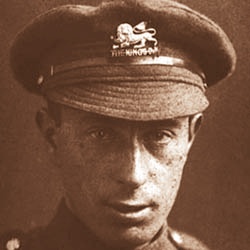
Isaac Rosenberg
(1890 – 1918)
Break of Day in the Trenches
The darkness crumbles away.
It is the same old druid Time as ever,
Only a live thing leaps my hand,
A queer sardonic rat,
As I pull the parapet’s poppy
To stick behind my ear.
Droll rat, they would shoot you if they knew
Your cosmopolitan sympathies.
Now you have touched this English hand
You will do the same to a German
Soon, no doubt, if it be your pleasure
To cross the sleeping green between.
It seems you inwardly grin as you pass
Strong eyes, fine limbs, haughty athletes,
Less chanced than you for life,
Bonds to the whims of murder,
Sprawled in the bowels of the earth,
The torn fields of France.
What do you see in our eyes
At the shrieking iron and flame
Hurled through still heavens?
What quaver—what heart aghast?
Poppies whose roots are in man’s veins
Drop, and are ever dropping;
But mine in my ear is safe—
Just a little white with the dust.
Isaac Rosenberg poetry of The Geat War
fleursdumal.nl magazine
More in: Archive Q-R, Rosenberg, Isaac, WAR & PEACE
Onder de titels Wilden en Nieuwe Wilden presenteren Museum de Fundatie en het Groninger Museum tot en met 18 september 2016 een dubbeltentoonstelling gewijd aan het 20ste-eeuwse expressionisme in Duitsland. In Museum de Fundatie staat het expressionisme uit het begin van de eeuw centraal, het Groninger Museum toont het neo-expressionisme uit de jaren ’80. Meer dan een halve eeuw scheidt de beide bewegingen, toch is er bij alle verschillen een duidelijke gemene deler: artistieke vrijheid zonder compromis.
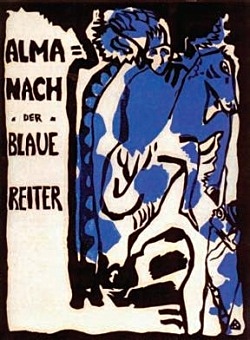 Artistieke conventies en academische regels werden ingeruild voor subjectieve ervaringen. In Duitsland manifesteerde het expressionisme zich aan het begin van de twintigste eeuw in het werk van leden van de kunstenaarsgroeperingen ‘Brücke’ en ‘Der Blaue Reiter’. Met hun compromisloze visie veranderden kunstenaars als Alexej von Jawlensky, Wassily Kandinsky, Emil Nolde, Ernst Ludwig Kirchner, August Macke, Franz Marc en Max Pechstein voorgoed het gezicht van de moderne kunst. De expositie WILDEN – Expressionisme van ‘Brücke’ & ‘Der Blaue Reiter’, toont met zo’n 100 werken het eerste grote museale overzicht in Nederland van Duitse expressionistische schilderkunst.
Artistieke conventies en academische regels werden ingeruild voor subjectieve ervaringen. In Duitsland manifesteerde het expressionisme zich aan het begin van de twintigste eeuw in het werk van leden van de kunstenaarsgroeperingen ‘Brücke’ en ‘Der Blaue Reiter’. Met hun compromisloze visie veranderden kunstenaars als Alexej von Jawlensky, Wassily Kandinsky, Emil Nolde, Ernst Ludwig Kirchner, August Macke, Franz Marc en Max Pechstein voorgoed het gezicht van de moderne kunst. De expositie WILDEN – Expressionisme van ‘Brücke’ & ‘Der Blaue Reiter’, toont met zo’n 100 werken het eerste grote museale overzicht in Nederland van Duitse expressionistische schilderkunst.
Niet de buitenwereld maar de binnenwereld, daar ging het de expressionisten om. Kunst als uitdrukking van emotie en innerlijke beleving.
De baanbrekende kunst van het expressionisme was de weerslag van sociale en wetenschappelijke veranderingen in de jaren vóór en vlak na de Eerste Wereldoorlog in Duitsland. De oprukkende industrialisering, de explosief groeiende steden, de ‘ontgoddelijking’ van de samenleving – “God is dood”, zei Nietzsche –, de ontdekking van het onderbewuste en de opkomst van de psychoanalyse, alsook de ontwikkeling van de kwantummechanica en relativiteitstheorie zetten het vertrouwde mens- en wereldbeeld op zijn kop. Oude zekerheden vielen weg en een nieuwe, grotendeels (nog) onbekende realiteit diende zich aan. De unieke positie van de mens in de schepping werd betwijfeld. De expressionistische kunstenaars keerden zich tegen het materialistische vooruitgangsdenken, dat vooral zakelijk en rationeel was. Zij richtten zich voortaan op de geestelijke wereld die achter de materie schuilging en wilden de band tussen mens en natuur herstellen.
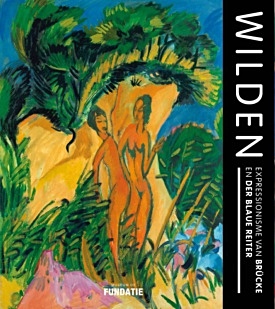 De expressionisten stonden kritisch tegenover het onpersoonlijke stadsleven en verheerlijkten de eenvoud van het platteland. Zogenaamd primitieve volkeren werden als de ware erfgenamen van het verloren paradijs tot voorbeeld genomen, zowel in leven als in kunst. Geen materialisme en burgerlijkheid, maar originaliteit en echt contact. In artistieke zin was het expressionisme een reactie op het inmiddels als gezapig betitelde impressionisme, dat – letterlijk – oppervlakkig werd bevonden door zijn focus op de buitenkant van de wereld. Kunstenaars van ‘Brücke’ en ‘Der Blaue Reiter’, opgericht in respectievelijk in 1905 in Dresden en in 1911 in München, hielden zich juist bezig met het innerlijk en met de oorspronkelijke, geestelijke eenheid van mensen, dieren en planten. Zij wilden niet de optische realiteit weergeven, maar de subjectieve ervaring van de mens in zijn natuurlijke omgeving. Bevrijd van de noodzaak zich te houden aan de werkelijkheid zochten de Duitse expressionisten naar alternatieve methoden om hun visie uit te dragen. Ongekend felle kleuren en krachtige vormen werden de dragers van ideeën en emoties. Nolde, Kirchner, Pechstein en andere leden van ‘Brücke’ bleven bij alle stilering vasthouden aan de herkenbaarheid van hun onderwerpen. Leden van ‘Der Blaue Reiter’, met name Jawlensky en Kandinsky, voerden hun streven naar vergeestelijking daarentegen zo hoog op dat zij de materiële wereld oplosten in een volledig voorstellingsloos beeld. Zodoende stonden zij mede aan de basis van de abstracte kunst.
De expressionisten stonden kritisch tegenover het onpersoonlijke stadsleven en verheerlijkten de eenvoud van het platteland. Zogenaamd primitieve volkeren werden als de ware erfgenamen van het verloren paradijs tot voorbeeld genomen, zowel in leven als in kunst. Geen materialisme en burgerlijkheid, maar originaliteit en echt contact. In artistieke zin was het expressionisme een reactie op het inmiddels als gezapig betitelde impressionisme, dat – letterlijk – oppervlakkig werd bevonden door zijn focus op de buitenkant van de wereld. Kunstenaars van ‘Brücke’ en ‘Der Blaue Reiter’, opgericht in respectievelijk in 1905 in Dresden en in 1911 in München, hielden zich juist bezig met het innerlijk en met de oorspronkelijke, geestelijke eenheid van mensen, dieren en planten. Zij wilden niet de optische realiteit weergeven, maar de subjectieve ervaring van de mens in zijn natuurlijke omgeving. Bevrijd van de noodzaak zich te houden aan de werkelijkheid zochten de Duitse expressionisten naar alternatieve methoden om hun visie uit te dragen. Ongekend felle kleuren en krachtige vormen werden de dragers van ideeën en emoties. Nolde, Kirchner, Pechstein en andere leden van ‘Brücke’ bleven bij alle stilering vasthouden aan de herkenbaarheid van hun onderwerpen. Leden van ‘Der Blaue Reiter’, met name Jawlensky en Kandinsky, voerden hun streven naar vergeestelijking daarentegen zo hoog op dat zij de materiële wereld oplosten in een volledig voorstellingsloos beeld. Zodoende stonden zij mede aan de basis van de abstracte kunst.
Wilden – Expressionisme
van ‘Brücke’ en ‘Der Blaue Reiter’
t/m 18 september 2016
Museum de Fundatie
Blijmarkt 20
8011 NE Zwolle
Telefoon: 0572 388188
info@museumdefundatie.nl
# meer info website museum de fundatie
fleursdumal.nl magazine
More in: *War Poetry Archive, Art & Literature News, Exhibition Archive, EXPERIMENTAL POETRY, Expressionism, Expressionisme, Galerie Deutschland, PRESS & PUBLISHING
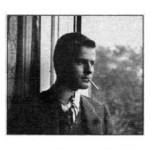
Hans Leybold
(1892-1914)
Ende
Die Wellen meiner bunten Räusche sind verdampft.
Breit schlagen, schwer und müd
die Ströme meines Lebens über Bänke
von Sand.
Mir schmerzen die Gelenke.
In mein Gehirn
hat eine maßlos große Faust sich eingekrampft.
Hans Leybold poetry
fleursdumal.nl magazine
More in: *War Poetry Archive, Archive K-L, Leybold, Hans
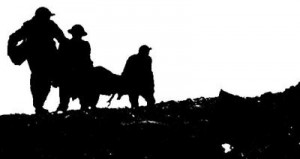
Wilfred Owen
(1893-1918)
Anthem for Doomed Youth
What passing bells for these who die as cattle?
– Only the monstrous anger of the guns.
Only the stuttering rifles’ rapid rattle
Can patter out their hasty orisons.
No mockeries now for them; no prayers nor bells;
Nor any voice of mourning save the choirs, –
The shrill demented choirs of wailing shells;
And bugles calling for them from sad shires.
What candles may be held to speed them all?
Not in the hands of boys, but in their eyes
Shall shine the holy glimmers of goodbyes.
The pallor of girls’ brows shall be their pall;
Their flowers the tenderness of patient minds,
And each slow dusk a drawing-down of blinds.
Wilfred Owen poetry
fleursdumal.nl magazine
More in: Archive O-P, Owen, Wilfred
Bert
BEVERS
Sedan, april 1940
Aan een grens een stadje dat
sluimert tegen verre heuvels.
Geen vijand valt er te bekennen.
Een officier te paard trekt
ter inspectie langs de wegen,
in handen los de teugels.
Onaangekondigd meldt de tijd
zich aan de poorten die
in rust gedompeld zijn.
Wat valt er hier dan meer te doen
dan in alledaagse sleur
te worden overrompeld?
Bert Bevers
(Verschenen in De Tweede Ronde, Amsterdam, 8ste jaargang, nummer 4)
fleursdumal.nl magazine
More in: *War Poetry Archive, Archive A-B, Bevers, Bert
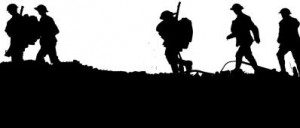
Wilfred Owen
(1893 – 1918)
A Terre
(being the philosophy of many soldiers)
Sit on the bed. I’m blind, and three parts shell.
Be careful; can’t shake hands now; never shall.
Both arms have mutinied against me,-brutes.
My fingers fidget like ten idle brats.
I tried to peg out soldierly,-no use!
One dies of war like any old disease.
This bandage feels like pennies on my eyes.
I have my medals?-Discs to make eyes close.
My glorious ribbons?-Ripped from my own back
In scarlet shreds. (That’s for your poetry book.)
A short life and a merry one, my buck!
We used to say we’d hate to live dead-old,-
Yet now…I’d willingly be puffy, bald,
And patriotic. Buffers catch from boys
At least the jokes hurled at them. I suppose
Little I’d ever teach a son, but hitting,
Shooting, war, hunting, all the arts of hurting.
Well, that’s what I learnt,-that, and making money.
Your fifty years ahead seem none too many?
Tell me how long I’ve got? God! For one year
To help myself to nothing more than air!
One Spring! Is one too good to spare, too long?
Spring wind would work its own way to my lung,
And grow me legs as quick as lilac-shoots.
My servant’s lamed, but listen how he shouts!
When I’m lugged out, he’ll still be good for that.
Here in this mummy-case, you know, I’ve thought
How well I might have swept his floors for ever.
I’d ask no nights off when the bustle’s over,
Enjoying so the dirt. Who’s prejudiced
Against a grimed hand when his own’s quite dust,
Less live than specks that in the sun-shafts turn,
Less warm than dust that mixes with arms’ tan?
I’d love to be a sweep, now, black as Town,
Yes, or a muckman. Must I be his load?
O Life, Life, let me breathe,-a dug-out rat!
Not worse than ours the lives rats lead-
Nosing along at night down some safe rut,
They find a shell-proof home before they rot.
Dead men may envy living mites in cheese,
Or good germs even. Microbes have their joys,
And subdivide, and never come to death.
Certainly flowers have the easiest time on earth.
‘I shall be one with nature, herb, and stone’
Shelley would tell me. Shelley would be stunned:
The dullest Tommy hugs that fancy now.
‘Pushing up daisies’ is their creed, you know.
To grain, then, go my fat, to buds my sap,
For all the usefulness there is in soap.
D’you think the Boche will ever stew man-soup?
Some day, no doubt, if…Friend, be very sure
I shall be better off with plants that share
More peaceably the meadow and the shower.
Soft rains will touch me,-as they could touch once,
And nothing but the sun shall make me ware.
Your guns may crash around me. I’ll not hear;
Or, if I wince, I shall not know I wince.
Don’t take my soul’s poor comfort for your jest.
Soldiers may grow a soul when turned to fronds,
But here’s the thing’s best left at home with friends.
My soul’s a little grief, grappling your chest,
To climb your throat on sobs; easily chased
On other sighs and wiped by fresher winds.
Carry my crying spirit till it’s weaned
To do without what blood remained these wounds.
Wilfred Owen poetry
fleursdumal.nl magazine
More in: *War Poetry Archive, Archive O-P, Owen, Wilfred
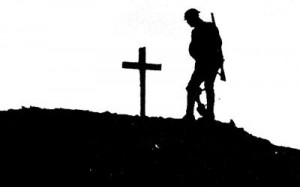
Wilfred Owen
(1893 – 1918)
Arms and the Boy
Let the boy try along this bayonet-blade
2How cold steel is, and keen with hunger of blood;
Blue with all malice, like a madman’s flash;
And thinly drawn with famishing for flesh.
Lend him to stroke these blind, blunt bullet-heads
Which long to muzzle in the hearts of lads.
Or give him cartridges of fine zinc teeth,
Sharp with the sharpness of grief and death.
For his teeth seem for laughing round an apple.
There lurk no claws behind his fingers supple;
And God will grow no talons at his heels,
Nor antlers through the thickness of his curls.
Wilfred Owen poetry
fleursdumal.nl magazine
More in: Archive O-P, Owen, Wilfred

Alun Lewis
(1915 – 1944)
Postscript: For Gweno
If I should go away,
Beloved, do not say
‘He has forgotten me’.
For you abide,
A singing rib within my dreaming side;
You always stay.
And in the mad tormented valley
Where blood and hunger rally
And Death the wild beast is uncaught, untamed,
Our soul withstands the terror
And has its quiet honour
Among the glittering stars your voices named.
Alun Lewis poetry
fleursdumal.nl magazine
More in: Lewis, Alun, WAR & PEACE

T.E. Hulme
(1883 – 1917)
Trenches: St Eloi
Over the flat slopes of St Eloi
A wide wall of sand bags.
Night,
In the silence desultory men
Pottering over small fires, cleaning their mess- tins:
To and fro, from the lines,
Men walk as on Piccadilly,
Making paths in the dark,
Through scattered dead horses,
Over a dead Belgian’s belly.
The Germans have rockets. The English have no rockets.
Behind the line, cannon, hidden, lying back miles.
Behind the line, chaos:
My mind is a corridor. The minds about me are corridors.
Nothing suggests itself. There is nothing to do but keep on.
T.E. Hulme poetry
fleursdumal.nl magazine
More in: Archive G-H, Hulme, T.E., WAR & PEACE
Thank you for reading Fleurs du Mal - magazine for art & literature